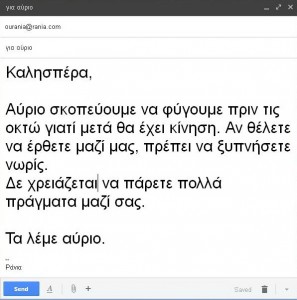Use of the conjunction “na” Posted by Ourania on Apr 21, 2014 in Grammar
The right use of the conjunctions ότι, πως, να (oti, pos, na) which mean “that” and “to”) is not always clear and Greek learners often misuse them (ελπίζω που instead of ελπίζω να etc.).
Verbs that express desire, wish, necessity, exhortation, possibility and prohibition are followed by the conjunction να (na, to) and a verb in the Subjunctive Mood.
Some examples:
1. Θέλω (thelo): Ι want
Θέλω να ταξιδέψω με αεροπλάνο (thelo na taxidepso me aeroplano).
I want to travel by plane.
2. Ελπίζω (elpizo): I hope
Ελπίζουμε να σας δούμε το καλοκαίρι (elpizoume na sas doume to kalokairi).
We hope to see you in the summer.
3. Σκοπεύω (skopevo): I intend
Ο αδερφός μου δε σκοπεύει να γυρίσει σύντομα (O aderfos mou de skopevee na girisee sintoma).
My brother doesn’t intend to come back soon.
4. Πρέπει (prepee): I must
Πρέπει να τελειώσω το μαγείρεμα πριν να γυρίσουν οι γονείς μου (prepee na teleeoso to magirema prin na girisoun ee gonis mou).
I must finish cooking before my parents come back.
5. Είναι ανάγκη (eene anagkee): I, you etc need to
Είναι ανάγκη να σε δω (eene anagkee na se do).
I need to see you.
6. Είναι απαραίτητο (eene aparetito): It’s necessary
Δεν είναι απαραίτητο να χρησιμοποιήσεις τόση ζάχαρη (den eene aparetito na hrisimopoiisis tosee zaharee)
It’s not necessary to use so much sugar.
7. Χρειάζεται (hreeazete): I, you etc. have to
Δε χρειάζεται να του τηλεφωνήσεις απόψε (de hreeazete na tou tilefonisees apospe).
You don’t have to call him tonight.
BE CAREFUL: χρειάζομαι (hreeazome) means “I need” and is followed by a noun.
Χρειάζομαι καινούριο υπολογιστή (Hreeazome kainourgio ipologistee).
I need a new pc.
8. Μπορώ (boro): I can
Με συγχωρείτε, μπορώ να κάνω ένα τηλεφώνημα; (Me sighorite boron a kano ena tilefonima)
Excuse me, can I make a phone call?
9. Μπορεί (boree): I, you etc. might
Μπορεί να δουλέψει και η Στέλλα μαζί μας. (Boree na doulepsee kai ee Stella maze mas)
Stella might work with us too.
10. Είναι δυνατόν / αδύνατον (eene dinaton, adinaton): It’s possible, it’s impossible
Είναι αδύνατον να μεταφράσω το βιβλίο πριν την Πέμπτη (eene adinaton na metafraso to vivlio prin tin Pempti).
It’s impossible to translate this book before Thursday.
11. Απαγορεύεται (apagorevete) : it is forbidden
Απαγορεύεται να ταΐζετε τα ζώα (apagorevete na taeezete ta zoa).
It is forbidden to feed the animals.
12. Έχω χρόνο / δεν έχω χρόνο (eho hrono, den eho hrono): I have the time, I don’t have the time
Δεν έχω χρόνο να πάω σινεμά (den eho hrono na pao sinema).
I have no time to go to the movies.
Έχεις χρόνο να πάμε στο γιατρό; (Ehees hrono na pame sto giatro)
Do you have time to go with me to the doctor?

Build vocabulary, practice pronunciation, and more with Transparent Language Online. Available anytime, anywhere, on any device.
About the Author: Ourania
Ourania lives in Athens. She holds a degree in French Literature and a Master’s degree in Special Education for Children. Since 2008, she has been teaching Greek to foreigners.




